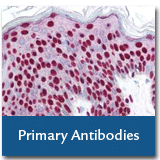
Primary antibodies are developed to specifically detect a particular antigen of interest.
Among the various biomolecules under investigation by researchers, specific antigens of choice could be of the following nature: proteins, peptides, carbohydrates or other small molecules. If specifically developed, primary antibodies can be developed to recognize a modification such as post translational modifications including phosphorylation, methylation, glycosylation or acetylation, making these antibodies great tools to study and distinguish proteins that are activated, silenced, processed and or may cause disease.
The assay format of these primary antibodies determines their application i.e. unconjugated or conjugated to a reporter (an enzyme or fluorophore). Conjugated primary antibodies are useful because they eliminate the need for a detection secondary antibody. Primary antibodies bind with high affinity and specificity, and are extremely useful for the detection of biomarkers. Primary antibodies are a crucial component in diagnostic tests for the detection of Parkinson’s and Alzheimer’s disease.
Primary antibodies can also be used to recognize antigens in numerous types of assay formats including Western Blot, Enzyme -Linked Immunosorbent Assay (ELISA), Analytical Cytology, Immunoprecipitation (IP), Immunohistochemistry (IHC), Immunofluorescence (IF), Flow Cytometry (FACS), Chromatin Precipitation (ChIP), Crystallography, Surface Plasmon Resonance (SPR), Neutralization and others
